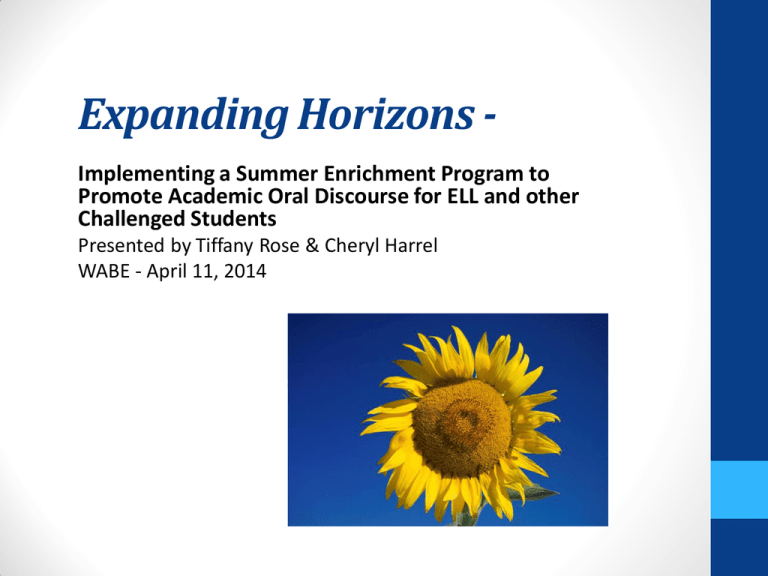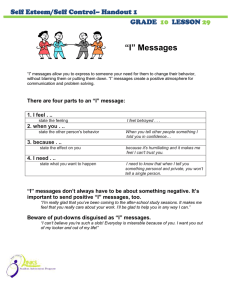Expanding Horizons – Implementing a Summer Enrichment
advertisement

Expanding Horizons Implementing a Summer Enrichment Program to Promote Academic Oral Discourse for ELL and other Challenged Students Presented by Tiffany Rose & Cheryl Harrel WABE - April 11, 2014 Intro – • Tiffany Rose • Cheryl Harrel School Demographics… • Largest elementary school in Mukilteo • 800 students, K-5 • 86 % poverty • 49 % qualified transitional bilingual students – although 65% Hispanic and 10% other ethnicities where English is not the first language of the home • 12% qualified special education students (source – OSPI Washington State Report Card) • Moved from “emerging school” designation to “focus school” in the fall of 2012 The germination of an idea… • What enrichment services could be provided to this school to help students bridge the gap? • What would be the focus? • Who would be the targeted population? • Who would teach? • Who would design, implement, and monitor the program results? • How would this be significantly different from other summer programs funded through Title? Expanding Horizons Summer Program was Born! • Oral language development/discourse, through the content of science, was set as the enduring understanding of the program… “Students will enhance language through reading, writing, listening and speaking to convey ideas precisely through general academic and domain specific sentences”. • Why this focus on oral language development? Common Core State Standards The New Standards… • raise the bar for learning; • raise the demand for language; • call for a high level of classroom discourse across all subject areas. Considerations • Students should not be removed from the challenges set out in the standards, but rather supported in meeting them. • ELL students can meaningfully participate in instruction through imperfect language. • Instruction must immerse students in meaning making language and literacy activities with appropriate scaffolding. (Schleppegrell, M. J., 2011. Academic language in teaching and learning, The Elementary School Journal, 112 (3), 409-4118. doi: 10.1086/663297) “Language is pretty invisible if you know it well. It is NOT invisible if you don’t know it well…” Dr. Lily Wong Fillmore (http://blogs.egusd.net/win/2013/01/15/language-is-prettyinvisible-if-you-know-it-well/) Overview of Curricular Choices and Professional Development Plan • • • • • Science curriculum – Delta Science Life science focus Ecosystems in particular 2 teachers per grade level (1-5) 1 para per classroom Oral language development curriculum (used by para-educators) – “Let’s Talk About It” (Mondo Publishing http://www.mondopub.com/c/@7mzHBE1szxoaM/Pages/product.html?nocache@1+rec ord@S5044) Strategy set used to make content accessible and provide multiple opportunities for discourse – Project GLAD Professional Development for Teachers Before, During, and After Program… • 3 days of release time to train with instructional facilitators (May/June) • On site meetings as needed with lead facilitator and principal during the 5 week program (July) • Follow up survey and debrief at program’s end (August) When training the teachers who were going to teach in the program, we used a “business” metaphor… • Chief Executive Officer: District Superintendent • Chief Operations Officer: Exec Director of Teaching and Learning • Chief Financial Officer: Director of Categorical Programs • Chief Compliance Officer: Retired principal • Head Biologist: Science TOSA • Crew: Instructional Facilitators • Consultants: Literacy TOSA and Title Instructional Facilitator Structure of 3 Release Training Days Teacher Training Day 1 • Individual grade level GLAD unit overview • GLAD strategy review • Daily GLAD strategy implementation schedule • Nuts and bolts and logistics of program • Afternoon prep materials time Teacher Training Day 2 • Intro to Delta science manuals & curriculum • GLAD strategy infusion • Assessment Teachers working through how they would incorporate GLAD strategies into their teaching of the science kit On Training Day 2, para-educators had their own training, and then joined the teachers for joint planning and materials creation Para-educator Training • Pre and Post Assessment • Let’s Talk About It Curriculum • ELD Group Frame Teacher Training Day 3 • “Deep Dive” into Delta science curriculum/kits • Critter care • Science safety 3 hours for Oral Language Development 1. GLAD Unit: Overarching GLAD unit to support the life science theme 2. Delta Science: Interactive life science curriculum with live organisms to keep students motivated and engaged 3. Let’s Talk About It: Oral language curriculum to expand student oral language production using the appropriate forms and functions of language taught by para-educators Intentionally taught “Tier 2” vocabulary along with science content academic (“Tier 3”) vocabulary Enduring Understanding: Students will enhance language through reading, writing, listening and speaking to convey ideas precisely through general academic and domain specific sentences. Essential Question: How do organisms interact differently between other organisms and their environments? 3rd Grade Language CCSS Oral Language Sentence Frames Week 1 Week 2 Week 3 Week 4 Week 5 L3: Apply Knowledge of language to understand how language functions in different contexts, to make effective choices for meaning or style, and to comprehend more fully when reading or listening. L6: Acquire and use accurately a range of general academic and domain-specific words and phrases sufficient for reading, writing, speaking and listening. SL1: Prepare for and participate effectively in a range of conversations and collaboration with diverse partners, building on others’ ideas and expressing their own clearly and persuasively. *Explain or Describe *Sequence *Compare/Contrast *Cause and Effect *Proposition and Support Problem/Solution Class Norms & Set-up Science Content Lessons #s Activities 1-3 (Note #3 is a 2-day Activity. Act#1: Identify Tier 2 Vocabulary Tier 3 Vocabulary Activities 3-6 Act#4: Contrast, Simulate Activities 7-9 (Note: Includes an Activity 6 revisit) Activities 7 & 10-12 (Note: Includes an Activity 7 revisit) Act#7: NA Act#10: Investigate Act#2: Observe, Compare, Differences Act#5: NA Act#8: Describe, Measure, Discuss Act#11: Distinguish, Determine Act#3: Record, Classify Act#6: Characteristics Act#9: Test Act#12: Formulate, Design, Carry Out Act#1: Ecosystem, Habitat Act#4: Aquarium, Community, Population Act#7: Hay Infusion, Populations Act#10: Budding, Frond, Reproduce Act#8: Foot, Head, Shell, Tentacle, Stimuli Act#11: Consumer, Food Chain, Producer Act#9: Fins, Gills, Scales Act#12: Control, Variable, Hypothesis Act#2: Field, Focus, Lens, Act#5: Adapt, Magnification, Power, Adaptation, Specimen Macroscopic Act#3: NA Act#6: Microscope Activity 12 (Day 2) & Activity 10 (Day ?Assessment? GLAD Unit Daily Schedule DAY 1 DAY 2 DAY 3 DAY 4 DAY 5 WEEK 1 July 8 -12 3 personal standard – “Show respect, make good decisions, solve problems” CCD – “explain/describe” Observation charts Inquiry Chart 3 personal standards Final definition CCD Big Book Literacy awards Chant T-graph for social skills Picture File Card Sort 3 personal standards CCD – word study Input - Graphic Organizer – “6 Kingdoms of Living Things” Literacy awards Add to T-graph 3 personal standards Review 6 Kingdoms with word cards Literacy awards Learning logs and ELD review Add to T-graph WEEK 2 July 15 - 19 3 personal standards CCD – “Sequence” Learning logs Chant – new and process from last week Add to T-graph Process inquiry chart 3 personal standards CCD – word study Revisit T-graph Exploration report Mind Map for pictorial Chant 3 personal standards Learning logs Process chant Interactive journals Found Poetry Field trips or assembly (beach or lake) WEEK 3 July 22 - 26 3 personal standards CCD – “compare & contrast” Sentence Patterning Chart (SPC) Literacy awards Read the walls – team tasks 3 personal standards CCD – “Cause & Effect” Process grid day 1 3 personal standards CCD – final definition Review pictorial with word cards Literacy awards Learning logs and ELD review Process chants Add to T-graph as needed 3 personal standards CCD – final definition PFC closed sort Chant and/or process chant Reading/Trading game (from SPC) 3 personal standards CCD – word study Revisit T-graph Team Tasks Expert Groups 1 & 2 3 personal standards Revisit T-graph Team Tasks Expert Groups 3 & 4 “Reptile Man” assembly 3 personal standards CCD – final definition Revisit T-graph (team evaluations) Process grid day 2 3 personal standards CCD – word study Co-op strip paragraph day 1 Literacy awards Field trips or assembly (beach or lake) 3 personal standards CCD – final definition Work on personal explorations/ closure & eval pieces 3 personal standards Read the wall with personal CCD Process Inquiry chart Continue work on personal explorations presentations 3 personal standards Chant Add to T-graph Co-op strip paragraph day 2 Literacy awards 3 personal standards Listen & Sketch Personal exploration presentations WEEK 4 July 29 – Aug 2 WEEK 5 Aug 5 - 9 3 personal standards CCD – “Proposition & Support” (problem/solution) Ear to ear reading Individual “Co-op Strip” “walk the walls” with partner about all Writing assessment – collect any completed by students learned – oral processing as precursor to writing assessment Intro the “must do” of individual tasks Students finish up writing assessment, then choose a “may do” individual piece Field trips or assembly Boeing: History of Flight presentation (bio fuels connection) Final field trip: Everett Children’s Museum GLAD Units (supporting the science curriculum) GLAD Units 1st – Organisms 2nd – Life Cycle of Butterfly 3rd – Plant & Animal Adaptions 4th – Energy Flows through Ecosystems 5th – Freshwater Ecosystems Science Kits Salt water aquarium Butterfly habitat How variables impact organism populations Food Chains & Webs Fresh water aquarium Para-educators used this curriculum in the third hour for 15 – 20 minutes, rotating small groups through, while the teacher rotated small reading groups, and students not in a group worked independently Para-educators also administered the pre/post oral assessments (teacher administered the writing assessment) Pre-Assessment: Administered Week 1 Post-Assessment: Administered Week 5 Components: • 10 pictures (5 related to GLAD unit, 5 related to science kit) • 4 points total possible for each picture ubric pt for identification but only using single word pts – used phrase pts - sentence with errors pts – sentence with little to no errors Results Pre-assessment School Wide, 1st -5th Post-assessment School Wide, 1st – 5th % Meeting Standard Initial % Meeting Standard Final 12% 57% Results per individual grade level 1st Initial – 0% 2nd Initial – 14% 3rd Initial – 30% 4th Initial – 0% 5th Initial – 17% 1st Final – 62% 2nd Final – 55% 3rd Final – 85% 4th Final – 9% 5th Final – 79% Results in one individual class Initial *** *** *** 20 28 4 10 3 6 18 8 5 18 Final 31 29 23 26 28 16 33 19 15 35 11 1 19 16 25 10 15 11 10 17 Self-assessment conversations with focus students Student A (level 2+ ELL) – Your target was to participate in class and team discussions, and to share out answers with the class when your number was called. What helped you meet this goal? I love reptiles, have bearded dragon and salamander at home, love to share with the class my good pets. So did having some idea about reptiles already help you understand about the anoles in our science kit? Yes, they are reptile lizards and are cold blooded like my bearded dragon. Did you like to tell the class about your pets? Yes, and now I know how better to say in English. I also love we learn about the Six Kingdoms of Living Things, and reptiles in Kingdom Animalia, phylum spinal chord, class reptile. Student B (on IEP for communication “disorder”) – Your target was to participate in class and team discussions, and to share out answers with the class when your number was called. What helped you meet this goal? I don’t like to talk in front of a lot of people. I know that, but you did it! And you took care of the anoles for me. What helped you be able to answer when I called your number? You let me sit in my chair and let me think for a minute before I had to say something to you. Plus when I was standing with everybody else by the poems nobody could hear just me – I don’t like my voice. So reading along with everyone else reading makes it easier for you? Yes – and I liked writing about the worms and the crickets and the anoles when we observed them. “Observed” was one of our CCD words – what does it mean? When you look at something closely and notice what it is doing. Student C (on IEP for social skills and communication “disordered”) – Your target was to participate in class and team discussions, and to share out answers with the class when your number was called. What helped you meet this goal? I liked when you pulled the spoon with my number on it – some teachers never called on me before but I watch Animal Planet so I know a lot about animals… Right now we are talking about sharing in class discussions. What helped you the most when you helped your team write that sentence for the cooperative strip paragraph? How were you able to tell your friend what to write about producers and energy? I learned from the Tundra picture that in every biome there are producers, consumers, and decomposers, and that they are all interdependent on each other. What does interdependent mean? It means everything relies on everything else. The grass needs the sun to grow, the crickets need the grass to eat, the anoles need the crickets to eat, and the worms break everything – decompose everything. That was in that chant you made us say a lot of times. Using some Marzano Strategies, we played many word games… Teachers’ & Paras’ Reflections… 100% of respondents said that training received for the program was right amount Extra comments – • It was great! • The training was awesome - extremely helpful, informative and practical without being overkill. • It was also amazing to have the 50 hours of prep time 63.6% of respondents said that the duration of the program (5weeks/5 days a week) was too long; 36.4% it was right amount of time Extra comments – • probably would have still been fine with only four weeks • 4 weeks would be the preference and matches other programs • 4 weeks would have been perfect. • either a four week program only or 5 weeks/4 days a week 90.9% of respondents said that GLAD strategy usage expectation was about right; 9.1% said it was too much. Extra comments – • Totally do-able. It's great practice for the rest of the year. • I LOVED that everyone in the building was doing something similar each week and day. It made collaboration so much easier. It was also the impetus that I think some of us really needed in order to implement the strategies with fidelity. Some additional comments – • It was great to have field trips each Friday. • An extremely motivating and exceptional program for low language learners (in addition to on grade level learners). I hope to see the program continue next summer. • This program was amazing for teachers and students! • The program was amazing and well put together. I am really proud to have been a part of this program, and am so thankful to those who put their blood, sweat and tears into making this happen. The quality curriculum, the small class sizes, having full time para support, and the professional development hours that preceded the program were not for nothing. Many of my students are telling me that they don't want summer school to end - love it!


